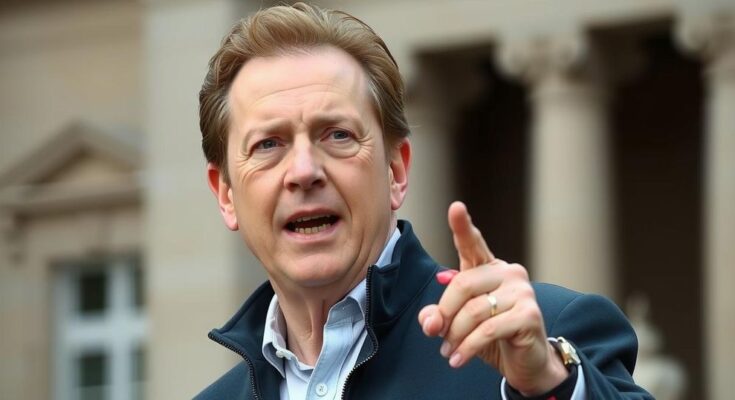Elon Musk voiced his support for the AfD in a recent op-ed, claiming it holds the key to saving Germany from cultural and economic collapse. This endorsement has prompted widespread criticism from various political leaders, who view it as an inappropriate interference in German elections. Musk’s comments raise concerns about foreign influence in domestic politics and the integrity of the press in electoral matters.
On December 30, 2024, Elon Musk publicly expressed his support for the far-right Alternative for Germany (AfD) party through an op-ed in the German newspaper Welt am Sonntag. Declaring the AfD as the final hope for Germany, Musk argued that the country is facing economic and cultural decline, and only the AfD could remedy this through a stringent immigration policy and deregulation of the market. This endorsement sparked considerable backlash, particularly from political figures like Friedrich Merz, who labeled Musk’s intervention as unwarranted interference in German politics. The AfD’s rise in popularity, currently polling at 20%, reflects a growing divide in German society, which critics assert Musk is exacerbating. Furthermore, concerns regarding press freedom and the influence of powerful figures in journalism have arisen due to the publication of Musk’s pro-AfD stance, especially within the context of the ongoing electoral debates in Germany. Musk’s economic interests, particularly his Tesla plant in Brandenburg, are suspected to influence his political endorsements, raising questions about the underlying motivations behind such significant public commentary.
The article discusses the implications of Elon Musk’s endorsement of the AfD, a populist party in Germany known for its far-right stance. Musk’s article not only critiques Germany’s current political climate but also reflects broader concerns about the influence of foreign figures in domestic political matters. The situation is set against Germany’s constitutional guarantees of freedom of expression and press, as the media grapples with maintaining neutrality in political discourse while facing pressure from powerful individuals and their interests. These dynamics illustrate the precarious balance between democratic values and media integrity, especially in an election context.
Musk’s endorsement of the AfD has contributed to an intensified dialogue regarding the influence of billionaires on democratic processes and the integrity of media representation. His views illuminate the ongoing challenges that Germany faces as it navigates political polarization and questions surrounding identity and economic revival. The backlash against Musk’s op-ed underscores the sensitivity of the political landscape in Germany, where foreign endorsements can significantly shape public perception and electoral outcomes. Ultimately, this situation exemplifies the need for vigilant safeguarding of democratic institutions against external influence.
Original Source: www.dw.com




